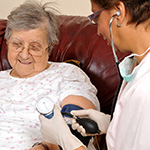Special Considerations for Orthodox Jewish Patients
Orthodox Jews observe certain strict rules and rituals to which medical professionals should be sensitive. These include not touching members of the opposite sex, except for spouses and immediate family members; dressing modestly, including maintaining head coverings even in a clinical setting; and, at the end of life, desiring to include a rabbinical advisor in medical decision-making.
One of the most important lessons learned from MJHS’ research on medical-decision making by Orthodox families relates to the role of the rabbi. The importance of bringing the rabbi into the conversation with the physician as early as possible cannot be overstated.
MJHS has adopted a LEARN Model* for supporting Orthodox families dealing with medical decisions. Though contextualized to conversations within an Orthodox Jewish community, key elements of this model are “best practices” for facilitating healing conversations between patients, family members and clinicians.
- L — Listen and dispel unwarranted assumptions. Listen to the clinical perspective without assuming that the health care system will automatically oppose their interest.
- E — Evaluate the practical information. Gain a clear picture of the medical facts, current condition of the patient and impending medical issues or treatment decisions in need of resolution.
- A — Ask the right questions to the right people. Determine who is best positioned to convene a family conference and who should participate.
- R — Reach consensus. Identify a facilitator, skilled in collaborative dialogue and conflict resolution, who can lead a value neutral conversation, with all decision-making parties present.
- N — Negotiate a plan. Define an action plan or system for future decision making, as changes can occur suddenly.
*MJHS Learn Model inspired by Elois Ann Berlin and William C. Fowkes Jr., A Teaching Framework for Cross-cultural Health Care. The Western Journal of Medicine, 1983, 139(6), 934.
For a more in-depth discussion of facilitating healing conversations, see the following articles:





